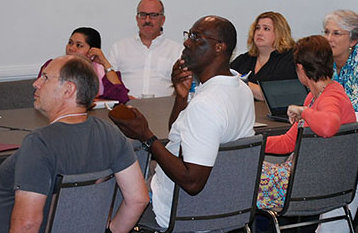REV. CHRIS MOMANY
General Bd Church and Society
Sometimes the process of good writing has all the romance of digging a ditch. And that’s all right. There is great dignity in authentic work of every kind, and a group of writers experienced this insight while attempting to re-envision two sections of the United Methodist Social Principles Aug. 24-25.A “writing team” of about 15 people gathered at the United Methodist Building in Washington, D.C., divided into two groups, and tackled the sections of the Social Principles now known as “The Natural World” and “The Economic Community.”
The experience was intense: beginning on a Monday morning and finishing on Tuesday. Between the break-out writing sessions, all participants checked in with one another and compared notes regarding the process. Those of us who served as contributors received quite an education.
Papal encyclicals?
Staff from the General Board of Church & Society did an excellent job of sending us copies of the Social Principles, dating all the way back to 1972. They also added some text from recent papal encyclicals.
This latter twist grabbed my attention. Why spend preparation time for a Wesleyan task by taking in Catholic social doctrine?
I say this as one who has been devouring encyclicals since Pope Leo XIII issued Rierum Novarum in 1891. At least it seems that I have been at it since then.
Yet our appreciation for papal writings was critical.
The team of writers was not asked to replicate social teaching from a different tradition, but we did consider the artful style of presentation that weaves profound biblical and theological emphases through teachings with social impact.
Perhaps our United Methodist document can develop its own elegance.
A bit like a laundry list
As they stand, our Social Principles are a bit like a laundry list of items that have been important to United Methodism for several decades. But we are seldom sure why such things are important, except for intermittent — and often out-of-place — homiletical claims that preface each series of statements.
” … tradition has an honorable practice of working out positions in messy parliamentary contexts.”
Much of this, of course, is due to the fact that our tradition has an honorable practice of working out positions in messy parliamentary contexts. The writing team wondered, however, if there might be a way to bring some timely and well-conceived coherence to the General Church for consideration.
My overall impression regarding the two-day writing session was that it was a remarkably dialogical process. We represented many voices, some with strongly formed convictions regarding moral principle. Yet we listened, heard and improved the insights of one another.
The experience was both tedious and rewarding.
Voices not at the table
We were also aware that several voices were not at the table. This strikes me as a necessary concern of every attempt to work on any such document. There were regions of the world that remained underrepresented, even after admirable efforts to assemble a very diverse team. Our honesty about this struggle can push us to even greater inclusion during future work.
The two subgroups developed very different methods for drafting their respective sections. The people working on “The Natural World” divided their task between small groups of two or three writers. Those addressing “The Economic Community” worked as a whole.
One group struggled to get the theological rationale just right, while the other sought to express sound Wesleyan principle, and then move on to detailed parts of the text.
Also, one included biblical references in a more explicit way than the other. This does not mean that one was attempting to impose proof-texts or that the other was neglecting biblical narrative. It simply points out the way two groups in adjoining rooms can develop differing styles of expression from the same theological tradition.
More concise material
The two-day session ended with written material significantly more concise than the current text. There was also more demonstrative theological grounding.
Before closing, writers engaged in a stimulating and incomplete discussion regarding the role post-World War II human-rights language should play in any revision of the Social Principles. On the one hand, this tradition has been critiqued for several decades by some scholars. It is also language that may sharpen the denomination’s confrontation with political powers, leaving sisters and brothers from non-democratic contexts at risk.
On the other hand, the academic critique of this tradition may have run its course. A renewed exploration of “rights” language might best express our call to serve as God’s witnesses.
Time will tell.
Last Updated on December 28, 2022

